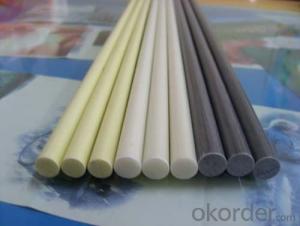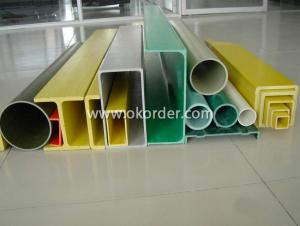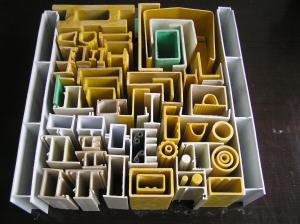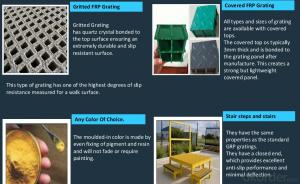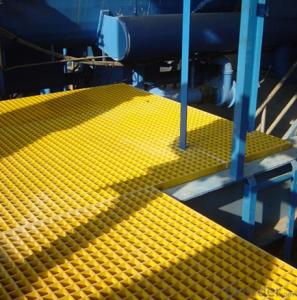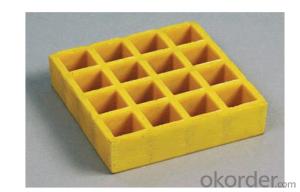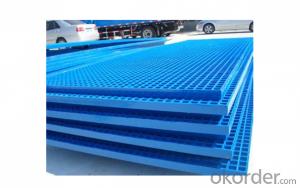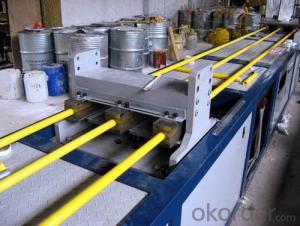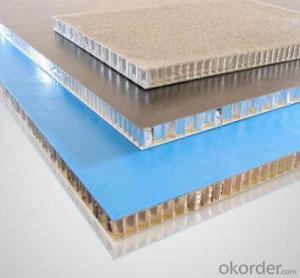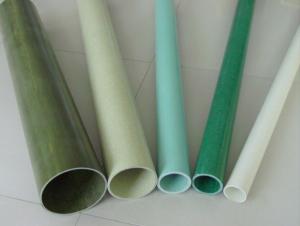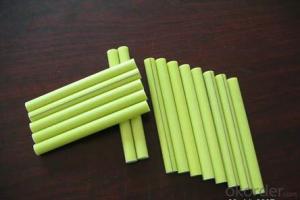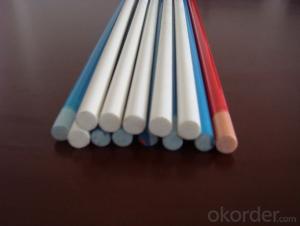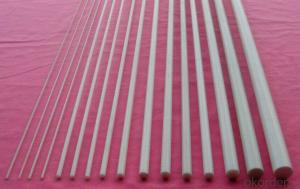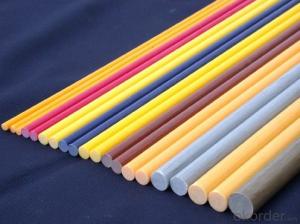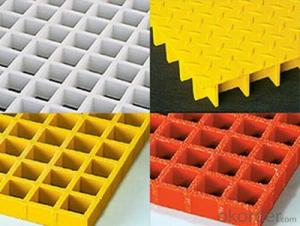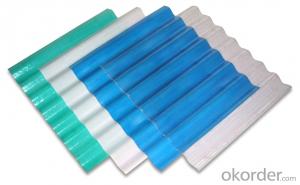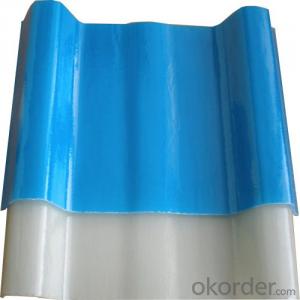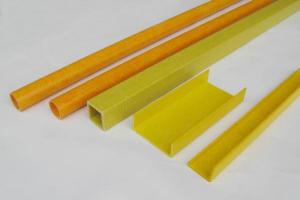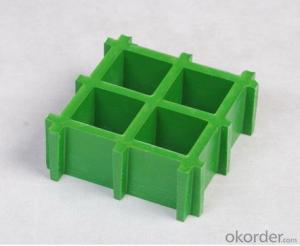High Strength FRP Fiberglass Rod
- Loading Port:
- China Main Port
- Payment Terms:
- TT OR LC
- Min Order Qty:
- -
- Supply Capability:
- -
OKorder Service Pledge
OKorder Financial Service
You Might Also Like
Specifications of High Strength FRP Fiberglass Rod:
1.Corrosion Resistant
2.Low Electrical & Thermal Conductivity
3.Light Weight & High Strength
Properties of High Strength FRP Fiberglass Rod:
--Light weight & high strength
--Excellent dimension stability
--Good flexibility:
--Corrosion & aging resistant ( can resist corrosion from various gas or liquid such as acid , alkali,arganic solvent and compound )
--Thermal/Electric non-conductivity
--Smooth&shinning surface
--Frp tube , frp pipe can be use as redoma antenna,as it's excellent insulation property. frp tube also can be use as tent pole , kite pole, toys pole , mode polel,flag pole,bag rods,curtain pole, marking pole, tool handle, umbrella, and other sport apparatuses as a supporting role.
- Q:What are the environmental benefits of using FRP pultrusion profiles?
- FRP pultrusion profiles offer several environmental benefits. Firstly, they are lightweight, which reduces the energy required for transportation and installation compared to traditional materials like steel or concrete. This leads to reduced carbon emissions during the entire lifecycle of the product. Additionally, FRP is highly durable and resistant to corrosion, which means that it has a longer lifespan and requires less maintenance and replacement. This reduces waste generation and conserves resources. Moreover, FRP pultrusion profiles are non-toxic and do not release harmful chemicals or pollutants into the environment. Overall, their use contributes to sustainable practices and helps in minimizing the environmental impact of various industries.
- Q:Are FRP pultrusion profiles resistant to alkaline substances?
- Yes, FRP pultrusion profiles are generally resistant to alkaline substances. The use of fiberglass reinforced polymer (FRP) in pultruded profiles provides excellent resistance to a wide range of chemicals, including alkaline substances. The resin used in the manufacturing process is typically a thermosetting polymer, such as polyester or vinyl ester, which offers high resistance to alkaline solutions. Moreover, the reinforcement of fiberglass imparts additional strength and durability to the profiles, making them highly resistant to corrosion and degradation from alkaline substances. However, it is important to note that the specific resistance of FRP pultrusion profiles to alkaline substances may vary depending on the specific resin formulation and manufacturing process. Therefore, it is recommended to consult with the manufacturer or supplier to ensure the profiles meet the desired resistance requirements for specific alkaline environments.
- Q:How do FRP pultrusion profiles perform in extreme heat temperatures?
- FRP pultrusion profiles perform exceptionally well in extreme heat temperatures. Thanks to their advanced composition of fiberglass reinforced polymer, they possess high resistance to heat and can withstand temperatures well above 200°C without losing their structural integrity or mechanical properties. This makes FRP pultrusion profiles a reliable choice for applications where exposure to extreme heat is a concern.
- Q:Can FRP pultrusion profiles be used in the transportation and logistics industry?
- Yes, FRP pultrusion profiles can be used in the transportation and logistics industry. These profiles offer a lightweight and high-strength alternative to traditional materials like steel or aluminum. They are resistant to corrosion, have excellent dimensional stability, and can be customized to meet specific design requirements. FRP pultrusion profiles are commonly used in applications such as truck bodies, trailers, shipping containers, and infrastructure for transportation and logistics purposes.
- Q:Are FRP pultrusion profiles resistant to fungi and mold?
- Yes, FRP pultrusion profiles are highly resistant to fungi and mold. The combination of the materials used in FRP (Fiber Reinforced Polymer) and the manufacturing process make them inherently resistant to biological growth. This makes FRP pultrusion profiles a durable and low-maintenance solution in environments prone to fungal and mold growth.
- Q:Can FRP pultrusion profiles be used in the construction and building materials industry?
- FRP pultrusion profiles are indeed applicable in the construction and building materials sector. These profiles are created by pulling continuous fibers through a resin bath and then into a heated die, which aids in curing the resin and shaping the profile. One of the primary advantages of FRP pultrusion profiles lies in their exceptional strength-to-weight ratio. Despite being lightweight, they possess incredible durability and strength, making them an optimal choice for construction purposes where weight reduction is desired. Moreover, FRP pultrusion profiles exhibit outstanding resistance to corrosion, which proves particularly advantageous in environments with moisture, chemicals, or harsh weather conditions. This corrosion resistance extends the lifespan of building materials, thereby reducing maintenance and replacement expenses. FRP pultrusion profiles can serve a wide array of construction applications, including structural components like beams, columns, and trusses. They are also frequently utilized as reinforcements in concrete structures, offering added strength and durability. Additionally, these profiles find utility in cladding, decking, handrails, ladders, and other non-structural elements within buildings. Furthermore, FRP pultrusion profiles provide design flexibility as they can easily be customized and manufactured to specific shapes, sizes, and properties. This adaptability renders them suitable for diverse construction projects, ranging from small-scale residential buildings to large-scale industrial complexes. In conclusion, FRP pultrusion profiles are highly appropriate for the construction and building materials industry due to their superior strength-to-weight ratio, corrosion resistance, design flexibility, and versatility.
- Q:Are FRP pultrusion profiles resistant to high-pressure or corrosive fluids?
- Yes, FRP pultrusion profiles are highly resistant to both high-pressure fluids and corrosive fluids. The composition of FRP (Fiber Reinforced Polymer) with its fiberglass reinforcement and resin matrix provides exceptional strength and durability. This makes FRP pultrusion profiles ideal for applications that involve exposure to high-pressure or corrosive fluids, as they can withstand these conditions without compromising their structural integrity.
- Q:Can FRP pultrusion profiles be used in the construction of highway guardrails?
- Yes, FRP pultrusion profiles can be used in the construction of highway guardrails. FRP (Fiber Reinforced Polymer) pultrusion profiles offer excellent strength-to-weight ratio, corrosion resistance, and durability, making them a suitable choice for guardrails. They are lightweight, easy to install, and require minimal maintenance, making them cost-effective in the long run. Additionally, FRP profiles can be molded into various shapes and sizes to meet specific design requirements, ensuring the safety and effectiveness of the highway guardrails.
- Q:Are FRP pultrusion profiles resistant to electrical arcing?
- Generally, FRP pultrusion profiles exhibit resistance to electrical arcing due to their composition of non-conductive materials such as fiberglass reinforced plastic. By not conducting electricity, these profiles prove to be an optimal choice when concerns arise regarding electrical arcing and conductivity. Nevertheless, it is crucial to acknowledge that the extent of their resistance to electrical arcing may differ based on the unique composition and design of the FRP pultrusion profiles. Therefore, it is advisable to consult the manufacturer or supplier of the profiles to ensure they meet the specific electrical resistance standards required for a given application.
- Q:Are FRP pultrusion profiles resistant to chemicals used in pharmaceutical manufacturing?
- Yes, FRP (Fiber Reinforced Plastic) pultrusion profiles are highly resistant to chemicals used in pharmaceutical manufacturing. FRP profiles are made by impregnating fibers with a resin matrix, typically polyester or vinyl ester, which provides excellent chemical resistance. These profiles are designed to withstand exposure to a wide range of chemicals including acids, alkalis, solvents, and various cleaning agents commonly used in pharmaceutical manufacturing processes. The combination of the fiber reinforcement and the chemical-resistant resin matrix makes FRP pultrusion profiles an ideal choice for applications where exposure to aggressive chemicals is a concern. Unlike traditional materials like steel or wood, FRP profiles do not corrode or react chemically with the substances they come into contact with. Furthermore, FRP pultrusion profiles offer several other advantages for pharmaceutical manufacturing applications. They have exceptional strength-to-weight ratio, are non-conductive, and have high mechanical resistance. Additionally, FRP is a non-porous material, preventing the absorption or release of chemicals, which is crucial for maintaining strict hygiene and avoiding contamination in pharmaceutical processes. Overall, FRP pultrusion profiles are a reliable and durable choice for pharmaceutical manufacturing environments, providing excellent resistance to the chemicals commonly used in these processes.
1. Manufacturer Overview |
|
|---|---|
| Location | |
| Year Established | |
| Annual Output Value | |
| Main Markets | |
| Company Certifications | |
2. Manufacturer Certificates |
|
|---|---|
| a) Certification Name | |
| Range | |
| Reference | |
| Validity Period | |
3. Manufacturer Capability |
|
|---|---|
| a)Trade Capacity | |
| Nearest Port | |
| Export Percentage | |
| No.of Employees in Trade Department | |
| Language Spoken: | |
| b)Factory Information | |
| Factory Size: | |
| No. of Production Lines | |
| Contract Manufacturing | |
| Product Price Range | |
Send your message to us
High Strength FRP Fiberglass Rod
- Loading Port:
- China Main Port
- Payment Terms:
- TT OR LC
- Min Order Qty:
- -
- Supply Capability:
- -
OKorder Service Pledge
OKorder Financial Service
Similar products
New products
Hot products
Related keywords
